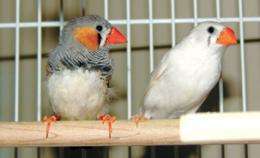Cooperative behavior is for the birds

(PhysOrg.com) -- Cooperative behaviors are rare in the animal kingdom and remain a great enigma for evolutionary biologists. A new study by Frederique Dubois, a professor at the University of Montreal Department of Biology and student Karine Larose, concludes that animals simply lack the cognitive abilities and social memory to engage in cooperative behaviors.
Altruistic behaviors have baffled evolutionary biologists for one simple reason: they make no sense from an evolutionary standpoint. Natural selection stipulates that a character trait is retained only when it provides a benefit to the individual. And clearly, altruistic behaviors benefit others.
A rare example of such behavior is seen in female vampire bats. When the females breast-feed their young they are unable to feed themselves, and so other females will share the blood they have collected, yet the example remains a rare occurrence.
Dubois and Larose set out to provoke cooperative behaviors in Zebra Finch birds using the famous prisoner's dilemma test, which illustrates how two players benefit more from cooperation than from pursuing individualist strategies. For this to work, several opportunities must present themselves so that one can anticipate the behavior of the other.
The Zebra Finch are monogamous birds and in the context of this experiment they learned that cooperation would provide each of them with more food than if they kept it all to themselves. “This cooperation was observed in controlled conditions and probably doesn't exist in the wild, where each bird must interact with many other birds than his or her partner,” says Dubois.
The success of this experiment highlighted an important element: for cooperation to occur, an individual must recognize the other and remember his or her actions. Therefore, social memory is essential to cooperation.
To verify this, Larose conceived of an experiment in which the memory of the bird was disturbed using a corticosterone implant. This hormone can provoke stress. Therefore, Zebra Finch couples that had chosen cooperative behaviors in the previous experiment stopped cooperating when the stress level was increased.
“In situations of stress, cooperative behaviors decrease to 15 per cent,” says Dubois. “The partners seem to have forgotten the reactions of the other from the previous experiment and both birds adopt an individualist approach which is less profitable. This proved the key role of memory in cooperation.”
According to Dubois, stress levels vary naturally from one individual to another within a species. The more stressed an individual is the less likely he or she is to cooperate. And according to Dubois, this doesn't strictly apply to birds but to humans as well.
The Dubois and Larose experiment with Zebra Finch showed a bird could eat from the bottom feeder and get one seed. Conversely, a bird could perch itself on the top feeder and distribute three seeds to its partner, making it more profitable for them to cooperate.
Provided by University of Montreal

















